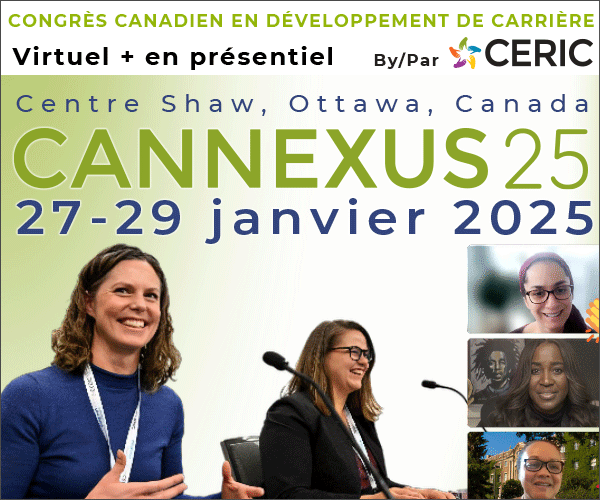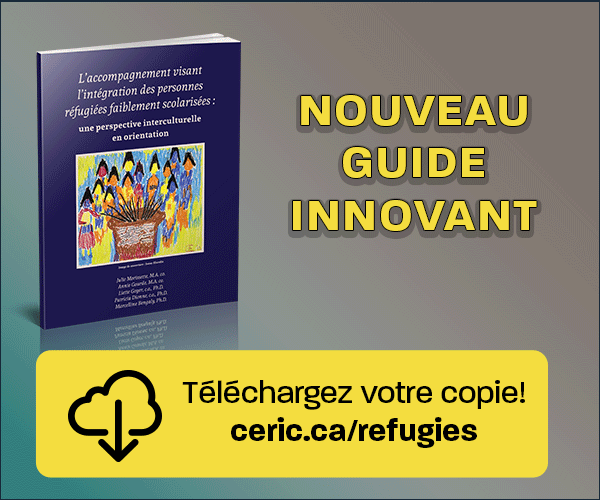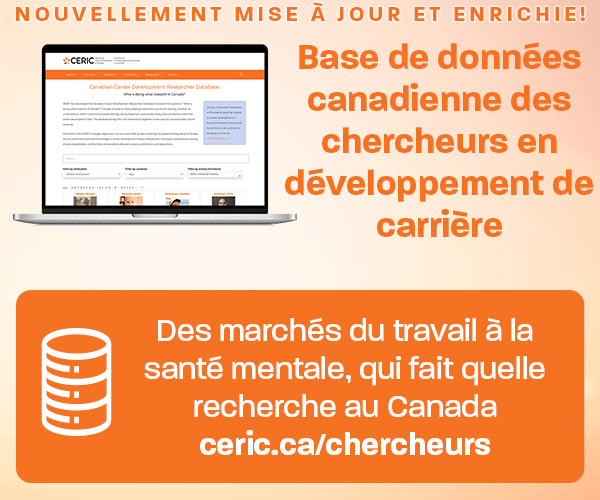Le rôle de la réflexion collaborative dans le développement de carrière des directeurs de programmes d'alphabétisation et de formation de base des adultes
Mots-clés :
développement de carrière, réflexion, pratique réflexive, développement professionnel, l'alphabétisation des adultesRésumé
Management development literature from a variety of fields shows reflection as effective means of career development (Ayas & Zeniuk, 2001; Condermin & Morrin, 2004; Harada, 2001; Jacobs & Heracleous, 2005). This qualitative, phenomenological study explored collaborative forms of reflection and their influence on the career development of adult literacy and basic education program directors. Findings show that participants engaged in several forms of collaborative reflection that contributed to their career development in various ways.
Références
Albrecht, N. M. R. (2003). University faculty collaboration and its impact on professional development. Unpublished doctoral dissertation, Kansas State University.
Alamprese, J. A. (1999, April). Adult basic education: Strategies for supporting learning. Paper presented at the International Conference on How Adults Learn, April
-8, 1999. Washington, D.C.
Arsenault, K. A. (2006). Reflective practice as a tool for peer mentoring new supervisors. Unpublished doctoral dissertation, Royal Roads University.
Ayas, K., & Zeniuk, N. (2001). Project based learning: Building communities of reflective practitioners. Management Learning, 32(1), 61-76.
Barnett, B. G. (1995). Developing reflection and expertise: Can mentors make the difference? Journal of Educational Administration, 33(5), 45-59.
Bolton, G. (2005). Reflective practice: Writing and professional development (2nd Ed.). London: SAGE Publications.
Boud, D., Keogh, R., & Walker, D. (1985). Reflection: Turning experience into learning. London: Kogan Press.
Boud, D. (1995). Enhancing learning through self assessment. London: Kogan Press.
Brockbank, A., McGill, I., & Beech, N. (2002). Reflective learning in practice. Hampshire: Gower.
Brockbank, A., & McGill, I. (1998). Facilitating reflective learning in higher education. Bristol, PA: Taylor and Francis.
Brookfield, S. D. (1990). The skillful teacher. San Francisco, CA: Jossey-Bass.
Brookfield, S. D. (1991). Developing critical thinkers: Challenging adults to explore alternative ways of thinking and acting. San Francisco, CA: Jossey-Bass.
Conderman, G. & Morin, J. E. (2004). Twenty ways to reflect on your practice. Intervention in School and Clinic, 40(2), 111-115.
Creswell, J. W. (2003). Research design: Qualitative, quantitative, and mixed methods approaches (2nd edition). Thousand Oaks, CA: SAGE Publications.
Daudelin, M. W. (1996). Learning from experience through reflection. Organizational Dynamics, 24(3), 36-48.
Daudelin, M. W. (1997). Polaroid through reflection. Management Development Review, 10(7), 282.
Davies, M. B. (2007). Doing a successful research project: Using qualitative or quantitative methods. New York, NY: Palgrave.
Dewey, J. (1910). How we think. New York: Dover Publications.
Dewey, J. (1933). How we think. A restatement of the relation of reflective thinking to the educative process (Revised ed.), Boston: D. C. Heath.
Dewey, J. (1938) Experience and Education. New York: Collier Books.
Driessen, E. W., van Tartwijk, J., Vermunt, J., & van der Vleuten, C. P.M. (2003). Use of portfolios in early undergraduate medical training. Medical Teacher, 25(1), 18-24.
Egbu, C. (2006). Knowledge production and capabilities – their importance and challenges for construction organizations in China. Journal of Technology Management in China, 1(3), 304-321.
Evans, D. (1997, September). Reflective learning through practice based assignments. Paper presented at the British Educational Research Association Annual Conference, University of York.
Gosling, J. & Mintzberg, H. (2004) . The education of practicing managers. MIT Sloan Management Review, 45(4), 19-23.
Harada, V. (2001). Professional development as collaborative inquiry. Knowledge Quest, 29(5), 13-19.
Husserl, E. (1927). Phenomenology. Encyclopedia Britannica.
Jacobs, C. D., & Heracleous, L. (2005). Answers for questions to come: Reflective dialogue as an enabler of strategic innovation. Journal of Organizational Management,
(4), 338-352.
Kolb, D. A. (1984). Experiential Learning: Experience as the source of learning and development. New Jersey: Prentice-Hall.
Knowles, Z., Borrie, A., & Telfer, H. (2005). Towards the reflective sports coach: issues of context, education, and application. Ergonomics, 48(11), 1711-1720.
Kreber, C. (2004). An analysis of two models of reflection and their implications for educational development. International Journal for Academic Development, 9(1), 29-49.
Liimatainen, L., Poskiparta, M., Karhila, R., & Sjogren, A., (2001). The development of reflective learning in the context of health counseling and health promotion
during nurse education. Journal of Advanced Nursing, 34(5), 648-658.
Lincoln, Y. S., & Guba, E. G. (1985). Naturalistic inquiry. Newbury Park, CA: SAGE Publications, Inc.
Lytle, S. L., Belzer, A., & Reumann, R (1992). Developing the professional workforce for adult literacy education. (Technical Report PB92-02). National Center for Adult Literacy.
Lytle, S. L., Belzer, A., & Reumann, R. (1993). Initiating practitioner inquiry: Adult literacy teachers, tutors, and administrators research their practice. (Technical Report
TR93-11). National Center for Adult Literacy.
Melnychuk, N. (2001). A cohort practicum model: Physical education student teachers experience. Alberta Journal of Educational Research, 47(3), 259-275.
Merriam, S. B., & Caffarella, R. S. (1999). Learning in adulthood (2nd ed.). San Francisco: Jossey-Bass.
Merriam, S. B., & Simpson, E L. (2000). A guide to research for educators and trainers of adults. Melbourne, FL: Krieger Publishing Company.
Mezirow, J. (1991). Transformative dimensions of adult learning. San Francisco: Jossey Bass.
Mezirow, J. & Associates (2000). Learning as transformation: Critical perspectives of a theory in progress. San Francisco: Jossey Bass.
Moon, J. (1999). Reflection in learning and professional development: Theory and practice. London, UK: Kogan.
Moon, J. (2004). A Handbook of reflective and experiential learning: Theory and practice. London, UK: Routledge Falmer.
Parsons, M., & Stephenson, M. (2005). Developing reflective practice in student teachers: Collaboration and critical partnerships. Teachers and Teaching: Theory and Practice, 11(1), 95-116.
Patton, M. Q. (2002). Qualitative research and evaluation methods. Thousand Oaks, CA: Sage Publications.
Pearce, H. (1995). The effects of reflective practice on the supervisory processes and professional growth. Unpublished doctoral dissertation, University of Missouri-Columbia.
Redmond, B. (2006). Reflection in Action: Developing reflective practice in health and social sciences. Aldershot, U.K.: Ashgate Publishing.
Rigano, D., & Edwards, J. (1998). Incorporating reflection into work practice: A case study. Management Learning, 29(4), 431-446.
Rodgers, C. (2002). Defining reflection: Another look at John Dewey and reflective thinking. Teachers College Record, 104(4), 842-866.
Schön, D. (1983). The Reflective practitioner: How professionals think in action. New York: Basic Books.
Smith, P. (1999). Challenges for the role of mentoring in promoting reflective practice. Journal of practice teaching in social work and health, 2(2), 51-62.
Smith, C., Hofer, J., & Gillespie, M. (2001). The working conditions of adult literacy teachers: Preliminary findings from the NSCALL staff development study. Focus on Basics, 4(D).
Walkington, J. (2005). Becoming a teacher: Encouraging development of teacher identity through reflective practice. Asia-Pacific Journal of Teacher Education, 33(1), 53-63.
Wellington, B. & Austin, P. (1996). Orientations to reflective practice. Educational Research, 38(3), 307-416.
Williams, Z. (2005). The educational confluence of andragogy and professional development: Maximizing adult learning: A systems perspective. Unpublished doctoral dissertation, University of Southern California.

Téléchargements
Publié-e
Comment citer
Numéro
Rubrique
Licence

Cette œuvre est sous licence Creative Commons Attribution - Pas d'Utilisation Commerciale - Pas de Modification 4.0 International.











